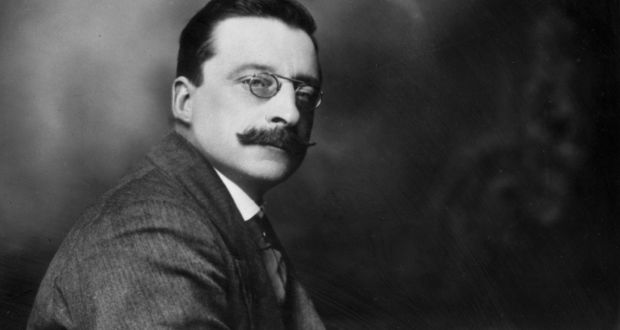Thomas Morrissey
The Enigma of Arthur Griffith: ‘Father of Us All’
by Colum Kenny (Merrion Press, €19.95)
The sub-title ‘Father of Us All’ stems from a declaration of W.T. Cosgrave in 1925 attributing to Michael Collins the statement: “Griffith was the greatest man of his age, the father of us all.”
There have been a number of biographies of Arthur Griffith. This book is different.
If it were a standard type of biography, much of its material might be considered extraneous to Griffith’s life. This, however, is a different approach to biography: a series of essays.
These are on such themes as Griffith and Mother Ireland; The Name of the Father; Ballads, Songs and Snatches; Women as Comrade and Wife; Griffith, Race and Africa; Connolly, Yeats, Synge and Larkin; and Arthur Griffith and Joyce’s Ulysses, provide the author with opportunities to explore literary and social backgrounds, to stray into the Oedipal implications of the homeland as ‘mother’ and Griffith as ‘father of us all’, and whether de Valera’s absence at different times (absence in America, absence from the treaty negotiations etc) might in some possible way be due to his unsettling personal experience of absent parents!
The author’s partiality for the works of James Joyce, especially Ulysses, results in frequent references to any mention of Griffith in Ulysses, irrespective of its value to an understanding of Arthur Griffith. Despite, and perhaps because of such treatment, the book is interesting and the result of research over many years.
Feature
A most interesting feature of The Enigma of Arthur Griffith is Mr Kenny’s examination of Griffith’s writings, especially the United Irishman and Nationality, as means to a greater understanding of the man, while also emphasising Griffith’s openness to publish articles by authors and on subjects which did not reflect his own views.
Apart from Griffith’s books and articles, Kenny has delved into a range of sources including the witness statements of more than 30 persons to the Bureau of Military History.
Certain chapters stand out for this reviewer: ‘Women as Comrade and Wife’, which reflect Griffith’s support for women’s rights and his special relationship with ‘Mollie’ (Maud) Sheehan, whom he married, and Maud Gonne, whom he greatly esteemed and who supported him and his paper; and the chapter on ‘His best friend’ Rooney and the impact on him of Rooney’s death.
The lead up to the treaty negotiations and the impact on Griffith, in particular, is vividly conveyed”
The first ten chapters are as much a work of literature as of history. From chapter eleven to the end, however, the emphasis is mainly on political history. Here ‘1902-1916: Sinn Fein and the Rising’ and ‘1917-1920: Griffith and de Valera’ are likely to engage and inform readers, as will chapters 14 and 15, which deal with the negotiations towards the signing of the Treaty.
In these chapters, the book comes alive in a special way.
The lead-up to the treaty negotiations and the impact on Griffith, in particular, is vividly conveyed: his poor health, the tension, the constant pressure from a range of meetings in London, and the travelling back and forth to Dublin to unhelpful and critical sessions with de Valera, Brugha and Stack, and sometimes a hurried return to England to meet a deadline of meetings there.
Eventually, it would appear, sheer exhaustion and wear and tear wore down the Irish representatives, while their opponents were on their home ground, without extensive travel, and well versed in negotiating skills.
Kenny explores all the different views on the signing of the treaty and examines the various criticisms of Griffith’s part in the negotiations. And then the reception in Dublin after the signing, the bitter debate, the country’s choice for the treaty, the civil war, and the impact of it all on an exhausted Griffith; the final stage, as grossly over-worked, and scarcely able to sleep, he goes in fear of his life, his health collapses and he dies from a heart attack.
The interested reader has to go again and again to the bibliography”
The book concludes with an estimation of Griffith’s contribution to Ireland of today.
One item that disturbs the full enjoyment of this work is the author’s habit of referring to authors quoted in the text by their surnames only, without initials or personal names, so that the interested reader has to go again and again to the bibliography to find out who the author is, which Martin, Mathews or Jones is being mentioned in the text.


 Arthur Griffith
Arthur Griffith 